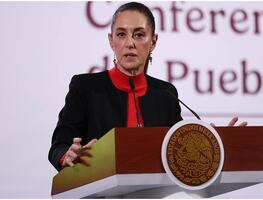Mexico City residents packed buses and subway cars and many walked or biked to work Wednesday, as authorities barred millions of vehicles from the streets due to a pollution alert.
Under new regulations imposed after the capital recently experienced its worst air-quality crisis in over a decade, the Phase 1 alert was declared when smog levels hit 1½ times acceptable limits on Tuesday.
Pollution levels were down somewhat Wednesday, but the alert will remain in place until at least 5 p.m. A dense haze obscured the volcanic mountains that ring the city.
On any given day a fifth of all cars are supposed to stay off the streets, but that doubles during a Phase 1 alert. Until recently, newer and cleaner cars were exempt from the ban.
With 2 million of the capital's cars ordered out of circulation, or 40 percent, fares were temporarily waved for public transportation. Buses crawling along the central Reforma boulevard were crowded during the morning rush hour.
"Public transport is not sufficient," said Martín Colín, a 53-year-old taxi driver, pointing to a bus jammed front-to-back with standing commuters. "They look like little sardines. The buses are full, full."
Traffic was noticeably lighter in some parts of the sprawling capital. But Colín, whose morning fares had already taken him to diverse parts of the city, said many of the usual bottlenecks were as bad as ever.
"It's the same," he said.
The vehicle ban does not apply to public or private buses - something that has drawn criticism since many privately operated minibuses are notorious for belching thick black smoke.
A truck drivers' protest against the "no circulation" rule partially blocked two major highways on the periphery of Mexico City, snarling traffic. The truckers are upset that the rule keeps them from making deliveries.
Other, unrelated political protests temporarily clogged central avenues in a city that's known for its constant demonstrations.
Taxis prowled the streets in visibly greater numbers, and finding an unoccupied cab to hail was more difficult than usual. Dispatchers reported increased demand, and Uber users complained of surge pricing several times higher than normal.
Many residents turned to Mexico City's expanding bicycle-share program for the commute.
Rosa Torres carpooled with friends and then used one of the loaner bikes to get the rest of the way to work. But when she arrived the station was full, and she had to wait behind five others for a spot to open up so she could drop the bike off.
"I'm leaving time to get from one place to another," Torres said of the "no circulation" rules.
Luis Arturo García also had to leave his car at home and was inspired to sign up for the bike-share program after his usual 10-minute commute stretched to 30.
"It affects me a lot because I work in the morning and study in the afternoon," he said. "They're pretty long trips, and public transportation doesn't work for me."
He said authorities need to improve public transportation and also suggested that increased telecommuting could help reduce pollution.
Factories across greater Mexico City were ordered to cut emissions by 30 to 40 percent, and gas stations without vapor recovery systems were told to close.
The anti-pollution measures announced last month last through the end of June, when the rainy season begins. Authorities say they are working on longer-term policies to be announced in the future.










